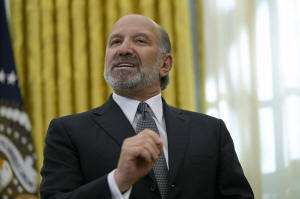|
At
the Commerce Department, Lutnick, who was CEO at the investment
firm Cantor Fitzgerald, will oversee 50,000 employees who do
everything from collecting economic statistics to running the
census to issuing weather reports. But he's likely to spend a
lot of time — along with Jamieson Greer, Trump's nominee to be
the top U.S. trade negotiator — managing the president's
aggressive plans to impose import taxes on U.S. trading
partners, including allies and adversaries alike.
The Sentae vote to confirm Lutnick was 51-45.
Trump views the tariffs as a versatile economic tool. They can
raise money to finance his tax cuts elsewhere, protect U.S.
industries and pressure other countries into making concessions
on such issues as their own trade barriers, immigration and drug
trafficking. Mainstream economists mostly view tariffs as
counterproductive: They are paid by import companies in the
United States, which try to pass along the higher costs to
consumers and can thereby add to inflationary pressures
throughout the economy.
At his confirmation hearing last month, Lutnick dismissed as
“nonsense'' the idea that tariffs contribute to inflation. He
expressed support for deploying across-the-board tariffs
”country by country'' to strong-arm other countries into
lowering barriers to American exports.
Trump last week announced plans for "reciprocal'' tariffs —
raising U.S. import tax rates to match the higher taxes that
other countries impose on goods from the U.S. The move would
shatter the rules that have governed world trade for decades.
Since the 1960s, tariff rates have mostly emerged from
negotiations between dozens of countries. Trump is commandeering
the process.
The president has also imposed 10% tariffs on Chinese imports
and effectively raised U.S. taxes on foreign steel and aluminum.
He has threatened — and delayed until March 4 — 25% tariffs on
goods from Canada and Mexico.
Lutnick was CEO at Cantor Fitzgerald when its offices were hit
in the Sept. 11, 2001, attack on the World Trade Center. The
firm lost two-thirds of its employees — 658 people — that day,
including Lutnick’s brother. Howard Lutnick led the firm's
recovery and is a member of the Board of Directors of the
National September 11 Memorial & Museum.
Lutnick has promised to sell off his business holdings. They're
complicated. His financial disclosure statement showed that he
had positions in more than 800 businesses and other private
organizations.
All contents © copyright 2025 Associated Press. All rights reserved

|
|




